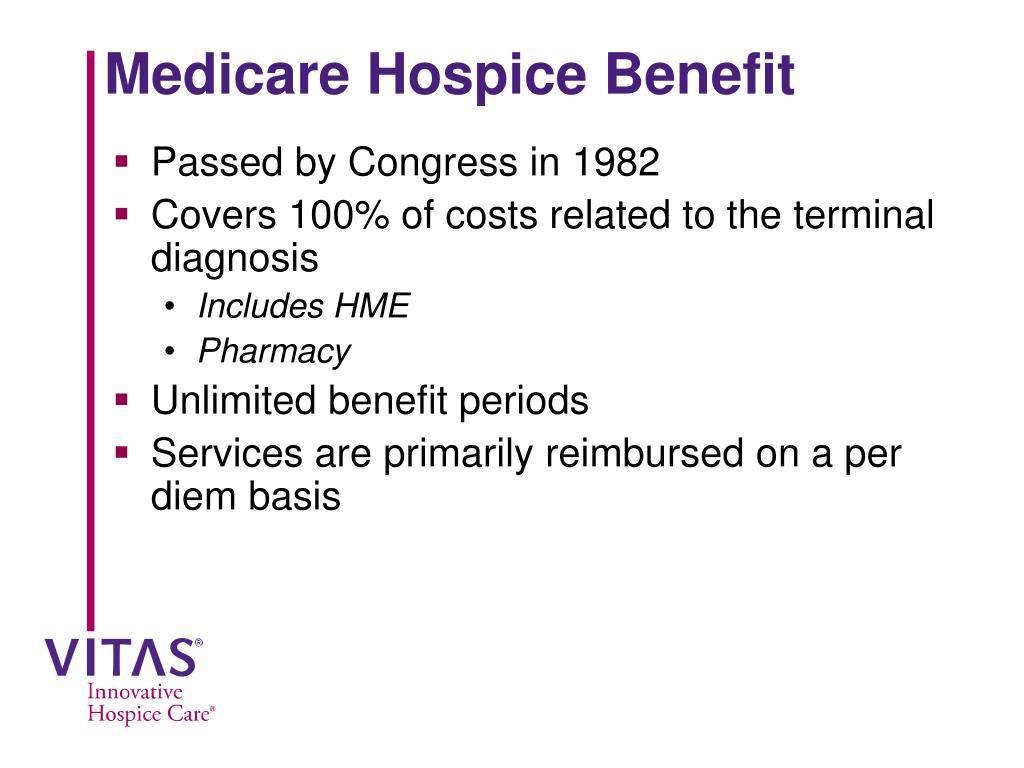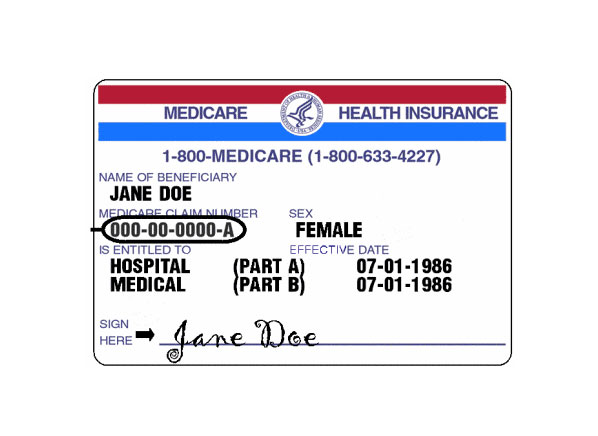
How Medicare Hospice Care Works
Unlike traditional care that seeks to cure the disease, hospice care focuses on maximizing the quality of life by providing comfort and support ser...
When to Consider Medicare Hospice Care
Medicare hospice care is an option to consider at the time your doctor renders a terminal prognosis, regardless of your diagnosis or physical condi...
Covered Medicare Hospice Services
You can receive Medicare hospice benefits under Original Medicare Part A when you meet these conditions: 1. You’re eligible for Original Medicare P...
What is hospice care?
Hospice is a program of care and support for people who are terminally ill (with a life expectancy of 6 months or less, if the illness runs its normal course) and their families. Here are some important facts about hospice:
How to find hospice provider?
To find a hospice provider, talk to your doctor, or call your state hospice organization. Visit Medicare.gov/contacts, or call 1-800-MEDICARE (1-800-633-4227) to find the number for your state hospice organization.
What is a Beneficiary and Family Centered Care Quality Improvement Organization?
Beneficiary and Family Centered Care Quality Improvement Organization (BFCC-QIO)—A type of QIO (an organization of doctors and other health care experts under contract with Medicare) that uses doctors and other health care experts to review complaints and quality of care for people with Medicare. The BFCC-QIO makes sure there is consistency in the case review process while taking into consideration local factors and local needs, including general quality of care and medical necessity.
Does Medicare cover hospice care?
Once you start getting hospice care, Original Medicare will cover everything you need related to your terminal illness, even if you choose to remain in a Medicare Advantage Plan or other Medicare health plan.
Can you stop hospice care?
If your health improves or your illness goes into remission, you may no longer need hospice care. You always have the right to stop hospice care at any time. If you choose to stop hospice care, the hospice provider will ask you to sign a form that includes the date your care will end.
What is palliative care?
Palliative care is the part of hospice care that focuses on helping people who are terminally ill and their families maintain their quality of life. If you’re terminally ill, palliative care can address your physical, intellectual, emotional, social, and spiritual needs. Palliative care supports your independence, access to information, and ability to make choices about your health care.
Does hospice cover terminal illness?
Your hospice benefit covers care for your terminal illness and related conditions. Once you start getting hospice care, your hospice benefit should cover everything you need related to your terminal illness, even if you remain in a Medicare Advantage Plan or other Medicare health plan.
What are the services that hospice provides?
Medicare hospice services that are typically covered when they’re needed to care for your terminal illness and related condition (s) include: 1 Physician services 2 Nursing care 3 Medical supplies (such as catheters) and equipment (such as walkers) 4 Prescription drugs for symptom control and pain relief (you may have to pay a $5 copayment) 5 Nutritional counseling; social worker services; and grief counseling for you and your family 6 Medicare hospice aide and homemaker services 7 Short-term inpatient care (for pain and symptom management) 8 Short-term respite care (you may need to pay a small copayment) 9 Other Medicare-covered services needed to manage your pain and other symptoms related to your terminal illness, as recommended by your Medicare hospice team
What is hospice care?
Unlike traditional care that seeks to cure the disease, hospice care focuses on maximizing the quality of life by providing comfort and support services. Medicare hospice care involves a core interdisciplinary team of professionals and caregivers who provide medical, psychological, and spiritual support tailored to the terminally ill person’s needs ...
How long is a hospice nurse on call?
Your regular doctor or nurse practitioner can also be part of this team. Furthermore, a Medicare hospice nurse and doctor are typically on call 24 hours a day, 7 days a week to give you and your family support and care when you need it.
When to consider hospice care?
Medicare hospice care is an option to consider at the time your doctor renders a terminal prognosis, regardless of your diagnosis or physical condition. You have the right to determine when you feel Medicare hospice care is appropriate (instead of continuing to treat your health condition) ...
What is short term respite care?
Short-term inpatient care (for pain and symptom management) Short-term respite care (you may need to pay a small copayment) Other Medicare-covered services needed to manage your pain and other symptoms related to your terminal illness, as recommended by your Medicare hospice team.
How long does a hospice patient have to live?
Before you enter a Medicare hospice care program, however, a Medicare-assigned doctor must certify that you’ve been diagnosed with a terminal illness and have a life expectancy of six months or less if the illness runs its normal course. When trying to make this difficult decision, you may want to discuss it with your doctor, ...
Is hospice covered by Medicare?
However, Medicare hospice care is covered directly by Original Medicare when you have a Medicare Advantage plan.
What is hospice care?
Hospice is a comprehensive, holistic program of care and support for terminally ill patients and their families. Hospice care changes the focus to comfort care (palliative care) for pain relief and symptom management instead of care to cure the patient’s illness. Patients with Medicare Part A can get hospice care benefits if they meet ...
What is hospice coinsurance?
Drugs and Biologicals Coinsurance: Hospices provide drugs and biologicals to lessen and manage pain and symptoms of a patient’s terminal illness and related conditions. For each hospice-related palliative drug and biological prescription:
How long does it take to live with hospice?
Their attending physician (if they have one) and the hospice physician certifies them as terminally ill, with a medical prognosis of 6 months or less to live if the illness runs its normal course.
What is the life expectancy of a hospice patient?
The FTF encounter must document the clinical findings supporting a life expectancy of 6 months or less. All hospice care and services offered to patients and their families must follow an individualized written plan of care (POC) that meets the patient’s needs.
How much is coinsurance for hospice?
The coinsurance amount is 5% of the cost of the drug or biological to the hospice, determined by the drug copayment schedule set by the hospice. The coinsurance for each prescription may not be more than $5.00. The patient does not owe any coinsurance when they got it during general inpatient care or respite care.
What is spiritual counseling?
Spiritual counseling. Individual and family or just family grief and loss counseling before and after the patient’s death. Short-term inpatient pain control and symptom management and respite care. Medicare may pay for other reasonable and necessary hospice services in the patient’s POC.
How long does hospice care last?
Parts of Medicare and Hospice Coverage 1 Your hospice doctor and regular doctor must certify that you are terminally ill and expected to live six months or fewer. 2 You agree to accept palliative or comfort care instead of curing your illness. 3 You sign a statement accepting hospice care instead of other Medicare treatments for terminal illness.
How long can you stay in hospice care?
The maximum stay is five days each time for respite care, but it can be given only on a limited basis.
What is a medicaid supplement?
FYI: Medigap, also known as Medical Supplemental Insurance, helps cover certain costs or gaps in Medicare. Read my guide to the best Medicare supplemental plans to learn more.
What is Medicare Part A?
Medicare Part A covers most medically necessary hospital, skilled nursing facility, home health, and hospice care treatments, and also provides caregivers with respite. Under Medicare Part A, you’ll need to meet specific conditions certified by a hospice doctor and regular doctor. Your hospice doctor and regular doctor must certify ...
Does Medicare cover room and board?
Room and board are not covered by Medicare, but this depends largely on whether your hospice team deems you fit for short-term inpatient or respite-care services. Medicare won’t cover ambulance transportation or the care you receive as a hospital outpatient or inpatient.
What is Medicare Supplement Insurance?
Medigap, also known as Medicare Supplement Insurance, fills certain gaps in Original Medicare. Hospice care is, for the most part, covered by Part A and Original Medicare, but Medigap fills in for additional health costs such as copayments, deductibles, and coinsurance. To learn more, read my article What Is Medigap?
Does Medicare pay for hospice care?
Medicare pays the hospice provider for your care — no matter the amount. There’s no deductible for hospice care. The only expenses you’ll have to pay are Medicare Part A and B premiums, a copayment of up to $5 for prescription drugs, and 5% of the Medicare-approved amount for inpatient respite care, if applicable.
What does Medicare Part B cover?
Part B also covers durable medical equipment, home health care, and some preventive services.
Does Medicare cover tests?
Medicare coverage for many tests, items, and services depends on where you live . This list includes tests, items, and services (covered and non-covered) if coverage is the same no matter where you live.
What is hospice care?
Hospice care may also include prescription drugs to help manage your symptoms, such as pain.
How long can you live in hospice?
Your hospice doctor and your regular physician or nurse practitioner, if you have one, have determined that you have a terminal illness and are not expected to live longer than six months. You state in writing that you’re choosing hospice care instead of other Medicare-covered treatments for your illness.
Does Medicare cover hospice care?
Any care that is not set up or provided by your hospice team is not covered. Medicare typically only covers the hospice care coordinated by the hospice team you selected. If you decide to get some similar care from a different hospice provider, Medicare usually won’t cover it. However, if your primary care provider is the attending physician ...
Is hospice a facility?
Hospice care is often provided in the terminally ill person’s home, but there are also hospice care facilities. The comfort of being at home, rather than at a facility, during hospice care may be important to a person with a terminal illness.
What are the factors that determine Medicare coverage?
Medicare coverage is based on 3 main factors 1 Federal and state laws. 2 National coverage decisions made by Medicare about whether something is covered. 3 Local coverage decisions made by companies in each state that process claims for Medicare. These companies decide whether something is medically necessary and should be covered in their area.
What is national coverage?
National coverage decisions made by Medicare about whether something is covered. Local coverage decisions made by companies in each state that process claims for Medicare. These companies decide whether something is medically necessary and should be covered in their area.
